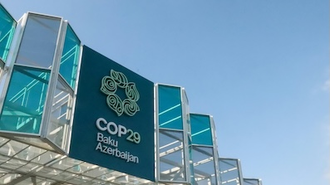COP29 has fallen completely flat - CAFOD

Photo by Matthew TenBruggencate on Unsplash
In the early hours of Sunday morning, the UN's 29th annual climate change conference, COP29, came to a close. Negotiations to decide the New Collective Quantified Goal on Climate Finance (NCQG) have ended in Baku with an incredibly weak outcome.
Liz Cronin, CAFOD's Climate Change Policy Lead said: "COP29, lamentably, has fallen completely flat. This was meant to be the 'Finance COP' where developed countries finally stepped up to meet their historic financial responsibilities. Instead, we saw familiar Global North battlelines drawn and stuck to, with the usual suspects blocking real progress on grant-based, polluter-pays finance and on the phase-out of coal, oil, and gas.
If we are to stand a chance of keeping to the 1.5°C target, countries must urgently deliver new and enhanced national climate plans that can get us there."
The final agreement is that developed countries will aim to provide and mobilise just $300 billion for developed countries, and only by 2035. Because there is no definition of what "climate finance" is, its quality and the form it comes in will be a complete Wild West. Debt-distressed climate-vulnerable countries simply cannot afford to take on yet more extortionate loans to pay for a crisis they have not caused. This paltry deal will simply not meet the enormous needs of developing countries on the frontlines. The UN's Standing Committee on Finance estimates these needs to be $5.012-6.852 trillion by 2030, at an absolute minimum.
$5-6.9 trillion is a huge amount of money. But here's the thing: the cost of inaction is astronomically higher:
By 2100, doing nothing will cost the global economy a whopping $1266 trillion, according to the World Meteorological Association.
The money is there, it's just in the wrong places.
Climate change is already being paid for, but out of disaster-struck developing countries' national budgets, rather than the polluting countries and companies that are largely responsible.
To raise the real amount of money needed for climate action, developed countries urgently need to explore innovative 'polluter pays' sources of finance.
Rich countries like the UK need to:
- Increase tax on carbon-intensive activities, like fossil fuel extraction, frequent flying, and on extreme wealth
- Phase out subsidies for fossil fuel (estimated at $7 trillion globally in 2022)
- Pursue debt-relief for climate-vulnerable countries in debt distress, to support them in prioritising their own climate action initiatives.
These measures would ensure it's polluters who pay for the crisis they have disproportionately caused, not ordinary taxpayers during a cost-of-living crisis.
The 2025 Jubilee Year offers an opportunity to take a bold step forward for the planet. Jubilee years in the Catholic Church are traditionally a time to address inequalities. Before COP30 in Brazil in November 2025, we all must come together and push for real and ambitious climate action, in every nation of the world.
LINK
CAFOD, the Catholic Agency for Overseas Development - https://cafod.org.uk/


















